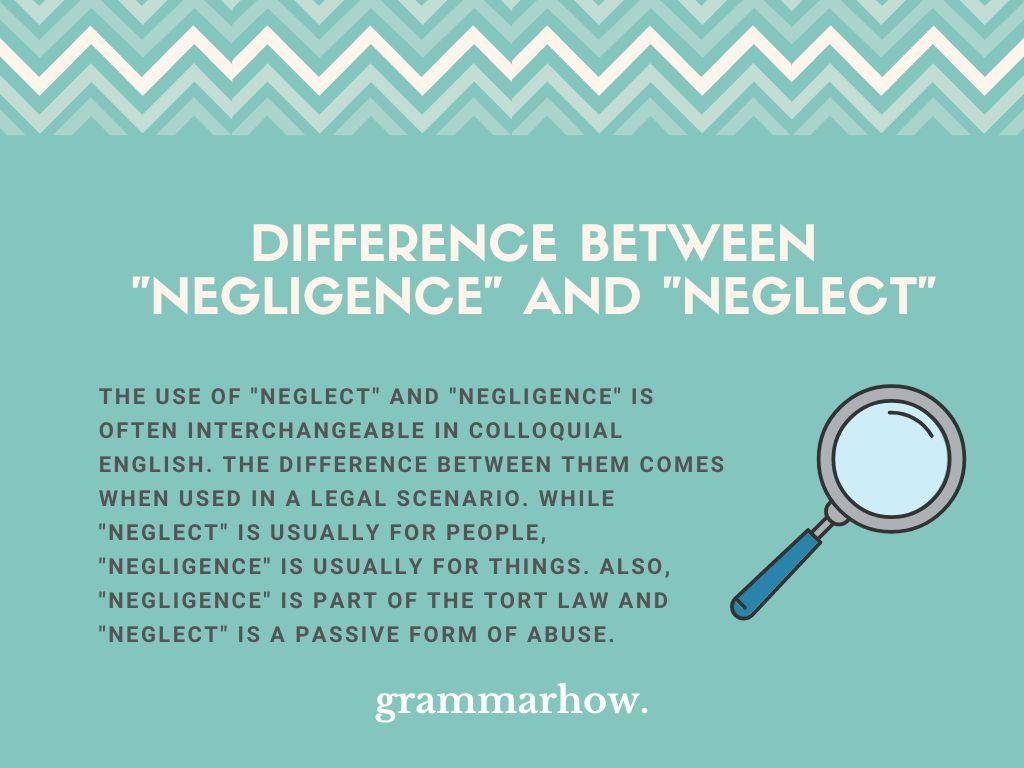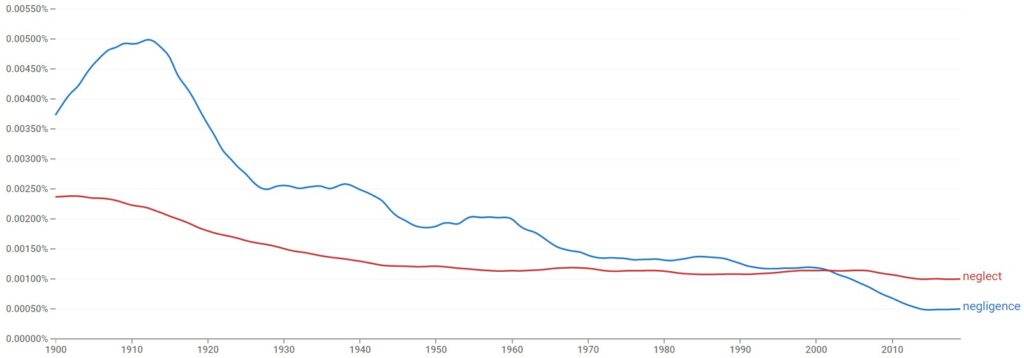Hearing the words “neglect” and “negligence” can make us doubt whether they are synonyms or not. Moreover, they are words used quite often in legal scenarios, and knowing their exact meaning can help you decipher legal language better. So, read on and never mistake these two words.
What Is The Difference Between “Negligence” And “Neglect”?
The use of “neglect” and “negligence” is often interchangeable in colloquial English. The difference between them comes when used in a legal scenario. While “neglect” is usually for people, “negligence” is usually for things. Also, “negligence” is part of the tort law and “neglect” is a passive form of abuse.

The use of “negligence” and “neglect” is completely interchangeable in colloquial English because the meaning is very similar: to fail in providing care not by an active action but because of a passive lack of care.
What Does “Negligence” Mean?
Negligence is a word used to refer to the lack of care or attention to something or someone that is under your responsibility. Moreover, negligence is the failure of delivering such care but it doesn’t imply a willingness to cause such damage; it’s caused by a lack of preventive actions.
Negligence, according to The Cambridge Dictionary is based on the failure to deliver “care or attention” to something or someone that “you are responsible for”. In this vein, negligence can apply to professionals, parents and caregivers, health personnel, and any other responsibility-driven job.
Furthermore, avoidable accidents because of a lack of preventive work or maintenance can be considered negligence and have legal consequences.
Let’s see some examples of how to use “negligence” in a sentence:
- This company will stand a trial for negligence in the Smith case.
- Can you recover after losing a case for negligence? Well, of course, you can!
- Being charged with culpable negligence and gross negligence is very different, you know?
- The entire family was there in the negligence trial exercising their legal rights.
- For the trial to go on, we need to move away from the “alleged negligence” label.
- Can this be another case of negligence or do you think he intended to leave it alone?
- Negligence might not be on purpose, but still, the damage is done.
What Does “Neglect” Mean?
The definition of “neglect” is a situation in which someone doesn’t give the proper attention or care to things or people that are their responsibility. Also, it can be used to talk about something you didn’t do because you forgot about it.
According to The Cambridge Dictionary, the word neglect as a noun refers to the situation in which not enough care or attention is given to someone or something, or the state of not receiving such care and attention.
Also, in the same dictionary, the definition can include not doing something because you forgot about it. For example, you could say: “I neglected to fill the tank when we left and now we have to do 100 extra miles to get gas.”
Let’s see how to use “neglect” in a sentence:
- Ever since he met her he has neglected everything else, including his career.
- The family house has fallen into a state of neglect since we left.
- There has been nothing but neglect to my constant plea for help.
- Do you mean you neglected to give her the key? Oh my, she must be furious!
- They took the child away as his parents were found guilty of neglect.
- If you continue to neglect bank letters, you’ll be in a big problem soon.
- The entire building is in a state of neglect; it is so different from its glorious years.
“Negligence” and “Neglect” – Usage in The English Language
To check popularity levels there’s no other tool more powerful than the Google Ngram Viewer. By checking it, we learn that, although “negligence” enjoyed a big popularity boom at the beginning of the 20th century, it has been in a negative trend from 1912 to this date.

“Neglect” on the other hand, experienced a far less steep negative curve and has enjoyed a steady popularity level since the 1950s. Plus, nowadays, “neglect” is more popular than “negligence”.
“Negligence” and “Neglect” – Synonyms
The use of synonyms is great to make any statement more dynamic, interesting, and colorful; thus, here are 5 synonyms you can use for these words.
- Dereliction
- Abandonment
- Disregard
- Inattention
- Carelessness

Martin holds a Master’s degree in Finance and International Business. He has six years of experience in professional communication with clients, executives, and colleagues. Furthermore, he has teaching experience from Aarhus University. Martin has been featured as an expert in communication and teaching on Forbes and Shopify. Read more about Martin here.
